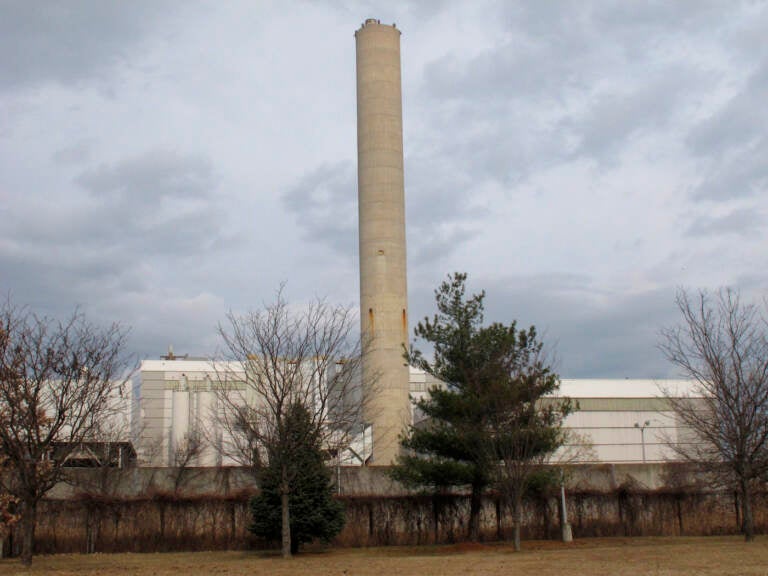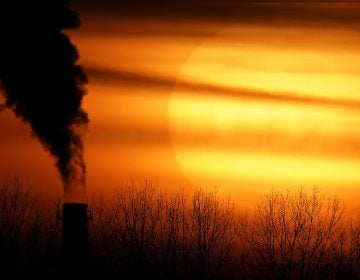N.J. advocates are mobilizing to prevent fossil fuel companies from expanding in low-income neighborhoods
A statewide coalition will host three workshops, where residents can learn about the harmful health impacts caused by incinerators and other polluting facilities.

This Jan. 25, 2022 photo shows a large trash incinerator in Rahway, N.J. (AP Photo/Wayne Parry)
Environmental justice organizations in New Jersey are mobilizing to prevent fossil fuel industries from expanding in low-income neighborhoods, which are disproportionately impacted by industrial pollution.
On Thursday, Aug. 24, EJ Communities Against Incineration will host a workshop in Camden titled “Liberation From Incineration,” where residents can learn about the harmful health impacts caused by incinerators and other facilities, such as fossil fuel power plants and superfund sites.
After New Jersey enacted an environmental justice law in 2020, predominantly Black and Hispanic cities like Camden, Newark, Trenton, and Atlantic City were designated as environmentally overburdened communities or OBCs.
Lower-income neighborhoods in suburban towns like Pemberton and Vineland also made the list. These areas tend to have more trash incinerators, sewage treatment centers, and other sources of pollution per capita than many other parts of the state, and some are located near major highways and airports.
“[Camden] gets everything nobody else wants,” said Angel Perez, co-executive director of the Center For Environmental Transformation in Camden. “We deserve the same thing that happens up the street from us, in communities that aren’t considered EJ (environmental justice) communities.”
Wednesday’s incineration workshop will take place at The Center For Environmental Transformation in Camden.
“We want to inform our communities about what’s here … and about alternatives, so they can actually have a conversation with their local council person, they can write to the governor and say, ‘hey, our community no longer wants this here,’” Perez said.
The 2020 law, requires the New Jersey Department of Environmental Protection, or NJDEP, to evaluate the environmental and public health stressors of certain facilities on overburdened communities when reviewing permit applications.
Industrial facilities that wish to apply for new or expanded permits, or permit renewal, in OBCs would first need to submit an environmental health impact statement with the state that “assess the potential environmental and public health stressors associated with a proposed new or expanded” project, according to the Legislature.
They would also need to host a public meeting, where residents and other community stakeholders can provide feedback and discuss environmental and public health concerns, and announce the meeting in two local newspapers, including one non-English language newspaper where applicable, at least 60 days in advance.
NJDEP would be required to deny permits for new facilities that would pose a significant health threat to overburdened communities. Essentially, the state would have more power to prevent new facilities from springing up in places that already have too many pollutants.
The department has until the end of the year to fully implement rules and regulations regarding the new law. Residents have until Sept. 4 to provide public comment.
“We need to end the practice of locating businesses on top of other polluting businesses. And the environmental justice law is the tool for policymakers and regulatory agencies to do just that,” said Ed Potosnak, executive director of the New Jersey League of Conservation Voters.
“There are a lot of proposals that come forward and [companies] try to place them, in places where they think the community wouldn’t be able to have the political power, voice, the financial ability, through lawyers and other means of communication, to stop it in its tracks,” Potosnak said.
He said the New Jersey League of Conservation Voters — which claims to hold government officials accountable on climate and environmental issues — advocated for the environmental justice law, and has actively participated in public discourse on proposed environmental justice regulations.
“People of color and low-income families are disproportionately more negatively impacted, because of industrialization, because of racist laws, some of which are environmental policies that organizations like ourselves in the past have supported,” Potosnak said. “So we’re working very aggressively to turn back the hands of time to right those injustices.”
One historically disenfranchised community disproportionately impacted by pollution is Newark’s Ironbound, an ethnically diverse, immigrant-rich working-class neighborhood of about 50,000 people.
According to the Ironbound Community Corporation, English is not the primary language for about 80% of Ironbound residents.
JV Valladolid, frontline communications manager for Ironbound Community Corporation, said environmental justice advocates in New Jersey are fighting to close what Valladolid called a loophole in the environmental justice law that would potentially allow companies to move to or expand in OBCs, if they “provide economic benefit” to the area.
“What that translates to is if they promise a few jobs to local community members, then they might still let them come in,” Valladolid said. “So it kind of defeats the purpose of the whole thing. So that’s something that we’ve been trying to organize around to see if folks can submit public comments.”
“It’s exploitative for the community to have to choose between a few jobs that might be offered and their health,” Valladolid said.
It comes as the federal and state governments act to mitigate climate change and harmful environmental impacts.
Last week, President Joe Biden signed a law, Democrats named the Inflation Reduction Act, that includes $360 billion to address climate change and cut emissions by 40% by 2030.
Potosnak said the measure, despite not being perfect, is a win for New Jersey. He said the state is expected to receive $10 billion to invest in clean energy alternatives, which he added would bolster the state’s offshore wind economy.
Perez and Valladolid, whose organizations are part of a larger coalition to bring clean energy solutions to marginalized communities, said the law has some benefits, but ultimately feels like it doesn’t do enough to rehabilitate their communities.
“There are two things that I read that make me question it,” Perez said.
“The first thing was the fact that in order to lease any new land for any alternative energy sources, like wind or solar, there has to be, within the last year, land leased to fossil fuel organizations,” Perez said. “I think that definitely dampens the expansion of renewable energies in America.”
Perez also suggested that subsidies for households that switch to solar power would primarily benefit people in the middle and upper classes.
The Liberation From Incineration workshop at the Center For Environmental Transformation in Camden begins at 4 p.m.
Subsequent seminars in Newark and Rahway are scheduled for Aug. 31 and Sept. 13, respectively.
WHYY is your source for fact-based, in-depth journalism and information. As a nonprofit organization, we rely on financial support from readers like you. Please give today.






